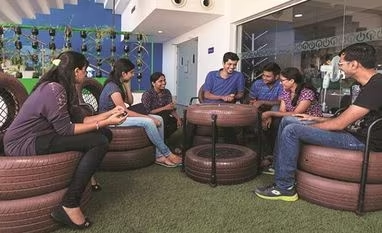Sudhir Tiwari is a big science fiction movie buff and passionate about Indian philosophy.
Rather than the epic Star Wars, Tiwari finds a lot of inspiration from science fiction action film ‘The Matrix’ and is excited about the release of ‘The Matrix-4’ this year.
As managing director (MD) of tech company ThoughtWorks India, Tiwari leads business strategy and builds high-performance teams. He also oversees investments in data and artificial intelligence (AI).
One such initiative that Tiwari is leading is Engineering for Research (E4R), where the firm collaborates with research organisations in understanding and solving problems in the fields of astronomy, biology, epidemiology and robotics.
“There are very clear business areas where we know the industry would move,” said Tiwari. “But there are always these questions around what technology stacks would they use as a lot of these tech stacks are going to change rapidly. Research firms are key areas as they are focused on cutting-edge technologies and think a few years ahead,” he added.
One of the projects is called the Thirty Meter Telescope (TMT), where engineers, astronomers, and project specialists are working together to build a next-generation observatory for the astronomical community.
According to the firm, with TMT, one will be able to study the universe like never before. These include finding answers to many grand challenges of science such as origin of galaxies, birth and death of stars and turbulent regions surrounding black holes. It would also help in discovering planets orbiting distant stars and the possibility of life in alien worlds.
ThoughtWorks – in association with the Indian Institute of Astrophysics – is collaborating with the TMT team to build various systems. This includes various software and data management systems. One of the unique problems is big data like photographs on the universe, which are massive files and come in at a very rapid pace. The aim is to find the right technology to service this kind of requirement.
“It is a matter of time before we start seeing the same volumes (of data) in every business,” said Tiwari. “For us, a lot of these projects are driving innovations,” he added.
For instance, after the outbreak of coronavirus, the E4R division started working on a project called BharatSim. It is a collaborative project between Ashoka University and ThoughtWorks, funded by the Bill & Melinda Gates Foundation. The vision for BharatSim is to build a distributed, multi-scale agent-based model simulation framework for the scientific community, to help envision the disease spread of Covid-19 in India.
It would enable modellers from various fields to provide useful analysis, predictions and input to policymakers to control the pandemic.
Most real-world systems are complex in nature. The agent-based modelling allows researchers to create models with the required complexity. It helps perform various what-if, if-what kind of scenarios to understand behaviour of the system.
Such models have applications in other industries, including financial institutions.
“The kind of problems we are solving will be seen in every industry,” said Tiwari, adding, “This gives us a headstart on various technologies and then obviously we take them mainstream.”
The scientific discovery process governs how scientists and engineers discover the laws of nature, new materials, and new medicines. Traditionally, these discoveries were made by humans.
Now, there is a growing community of scientists and engineers who believe machines can autonomously make discoveries in the future. Last year, ThoughtWorks hosted its first virtual E4R Symposium, which was based on the theme of AI earning a Nobel prize of its own.
Founded over 25 years ago, ThoughtWorks has grown from a small team in Chicago to a leading global software consultancy with more than 8,000 employees. It has expertise in providing digital transformation and software development. The company started its operation in India in 2001 as an offshore arm serving clients in the US and UK. This has evolved significantly. A large portion of the company’s employees is based in India. In the last few years, ThoughtWorks has also placed a major focus on the India market as well.
“It is a level-playing field now,” said Tiwari. “It is no longer about the technology, which reached the US, coming to India five years later.”
In India, ThoughtWorks is also working with a lot of global in house centres (GICs) to upgrade and modernise systems. One of the top customers is Chilean retailer Falabella, which has set up a centre in India.
Due to the Covid-19 pandemic, ThoughtWorks is witnessing rapid business growth, aided by strong demand for the company’s services and expanding digitalisation of its customers. The firm is betting big on opportunities in areas such as the financial industry, retail and pharma in India.
It is seeing that a lot of Indian companies are adopting technology, having aspirations to go global.
Referring to an article by Marc Andreessen, co-founder and general partner at venture capital firm Andreessen Horowitz, Tiwari said it is now very cheap to set up a business anywhere, leveraging cloud.
He said the company witnessed an improved order book. Some of the R&D investments that faced a blip due to the pandemic are also progressing.
When asked about his strategy during the pandemic, he said the company went into a communication overdrive. The firm also focused on the health of its employees. It helped the staff, who were travelling, to get back to India. Many employees were already doing work from home (WFH) at the firm. The strategy to scale up WFH for everyone helped it deliver projects to clients with minimum disruption.
Unlock 30+ premium stories daily hand-picked by our editors, across devices on browser and app.
Pick your 5 favourite companies, get a daily email with all news updates on them.
Full access to our intuitive epaper - clip, save, share articles from any device; newspaper archives from 2006.
Preferential invites to Business Standard events.
Curated newsletters on markets, personal finance, policy & politics, start-ups, technology, and more.
)